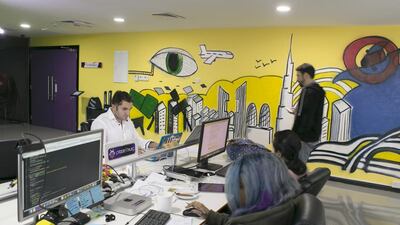When the digital marketer Dany El Eid, 33, first came across the technology of augmented reality, in 2010, it was still being used mainly for industrial and military purposes. But the Lebanese-Canadian could see the potential in using this technology to also serve children.
In 2012, together with the developer Denis Kruger, he set up Pixelbug, a tech company developing advanced augmented reality applications. After two years of research and design, the company launched the app Colorbug, which enables children to print out a colouring sheet and see it come to life exactly the way the colours were applied. But then there was the tricky issue of funding. For Mr El Eid, a possible answer lay in the MIT Enterprise Forum (Mitef) Arab Start-up competition, which he came across on Facebook, offering a US$50,000 top prize.
The competition, now in its ninth year, is organised by the MIT Enterprise Forum of the Pan Arab Region, one of the 28 worldwide chapters of the global MIT Enterprise Forum.
One of those who set up the competition is Hala Fadel, the Lebanese-French chairwoman of Mitef Pan Arab’s board, who is also chairwoman of the venture capital firm Leap Ventures.
“Our initial idea behind the competition was to impact mentalities in the Arab region to make them more entrepreneurial and risk-taking, and build the right spirit around competing and staying hungry,” says Ms Fadel. “The idea of changing mentalities is still there. In addition to that, now the competition provides training, mentorship, funding, networking opportunities and media exposure to aspiring entrepreneurs from throughout the Pan Arab region and supports much-needed economic development and job creation.”
For Mr El Eid, who has lived in Dubai for the past 11 years, the learning experience he gained from the competition started during the application process was immense. “The very thorough competition submission process enabled me to hone in on answers to some crucial questions about our business. It allowed me to really consider what was important in the path towards exponential growth and adding value to people’s lives. The mentors really challenged me to drill down into my thought process.”
Competitors apply to one of three tracks: ideas, start-ups and social entrepreneurship. Each track awards its first three ranked winners, with prizes totalling more than $150,000, as well as training, mentorship, coaching, media exposure and networking opportunities.
The competition judges look for entrepreneurs with the qualities of innovation, scalability of their project and social impact.
Pixelbug ticked all the boxes to win last year’s competition and its award money has been used as a much-needed buffer on operational spending. But learning insights as part of the competition process on how to thrive in the business world was just as valuable as winning.
“It has made our business a lot more meaningful. The move to a more product-orientated business strategy has allowed Pixelbug to focus a lot more on what really matters in terms of providing solutions that can help improve kids’ motor and imagination skills, while keeping them engaged through innovative use of technology. We saw immediate results after winning the competition from strong user uptake and positive feedback from the market for Colorbug.”
This year’s 77 semi-finalists will be selected after the competition closes today. They will be invited to attend pre-boot camps next month and in March in Egypt, Jordan, Morocco and the UAE. A five-day training event will be held in Jeddah, starting on April 11, with the winners announced on April 14.
Last year, more than 75 finalist teams were shortlisted from more than 15 Arab countries, picked from 4,275 individual and team applications that represented a record participation of more than 12,000 entrepreneurs. Even more applications are expected this year.
One of the competition's biggest success stories, so far, has been Instabeat from Lebanon, the winner in 2012. "Instabeat developed the first waterproof heads-up monitor that tracks, stores and displays feedback of your heart rate during your swim to optimise your training," says Ms Fadel. Instabeat was one of Forbes' Hottest Global Startups of 2013 and its founder, Hind Hobeika, made it to the 2014 Arabian Business magazine's "100 most powerful Arab women" list. "I see the quality of projects and teams improving each year," says Ms Fadel.
business@thenational.ae
Follow The National's Business section on Twitter

